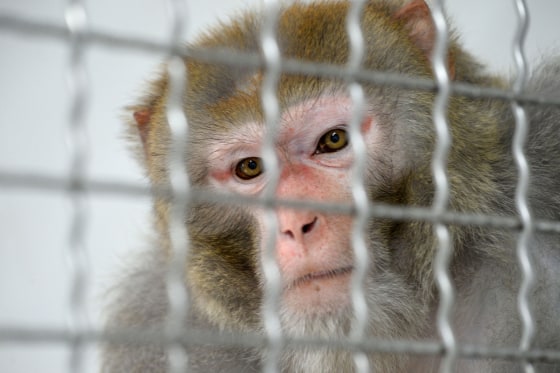
Police are still searching for
43 monkeys that escaped
from a research facility in South Carolina on Wednesday, as the head of the company revealed that the outbreak happened when a staff member failed to secure a door properly.
Police in Yemassee, Beaufort County, confirmed Thursday night that the primates were in the wooded region surrounding the Alpha Genesis facility, in a rural area on the edge of Yamassee.
Locals were urged to lock windows and doors and not to interact with the monkeys and instead call 911 immediately upon spotting any of the escaped primates. “These animals are highly sensitive and easily startled, we recommend that the public avoid the area to prevent frightening them further,” police said.
“The staff at Alpha Genesis are currently attempting to entice the animals back using food in order to ensure their safe capture,” the police statement said.
The company hopes that one-way traps containing apples will entice the animals.
Police also said Thursday that the monkeys were very young females weighing just 6 to 7 lbs. The company told the police that the animals were too young to carry disease, although it’s unclear whether this means they are incapable of contracting disease or simply hadn’t been introduced into any clinical trials.
Greg Westergaard, CEO of Alpha Genesis, told NBC News via email: “The incident yesterday involved a new enclosure, and occurred because the caretaker who was doing routine cleaning and feeding failed to secure two separate doors. It was purely human error.”
It is not the first time monkeys have escaped the facility — a total of 11 managed to break out in 2022, according to U.S. Department of Agriculture documents. Westergaard said they managed to find a seam in chain link fabric, but didn’t leave the property and were quickly rounded up.
Alpha Genesis carries out medical research for a range of clients for several conditions, including brain disorders. The company secured a federal contract to
run a colony of 3,500 monkeys
on Morgan Island off the coast of South Carolina, also known as Monkey Island.
Meanwhile, animal rights advocates have raised concerns over the ethics of using primates in medical research on such a scale.
Kathleen Conlee, VP of animal research issues for the Humane Society of the United States, a nonprofit based in Washington, previously worked at the facility in Beaufort County when it was owned by a different company and called for an end to monkey testing.
“These intelligent, social animals deserve protection, not exploitation. Congress must reject further investments in primate research infrastructure and instead focus on funding ethical, non-animal alternatives that are more effective, humane and cost taxpayers less money,” she said in a statement.
Lisa Jones-Engel, a primate scientist with the animals rights pressure group PETA, said in a statement: “The monkey experimentation industry has consistently failed to improve human health, and instead their actions continue to put the public at risk.”
Note: Thank you for visiting our website! We strive to keep you informed with the latest updates based on expected timelines, although please note that we are not affiliated with any official bodies. Our team is committed to ensuring accuracy and transparency in our reporting, verifying all information before publication. We aim to bring you reliable news, and if you have any questions or concerns about our content, feel free to reach out to us via email. We appreciate your trust and support!
